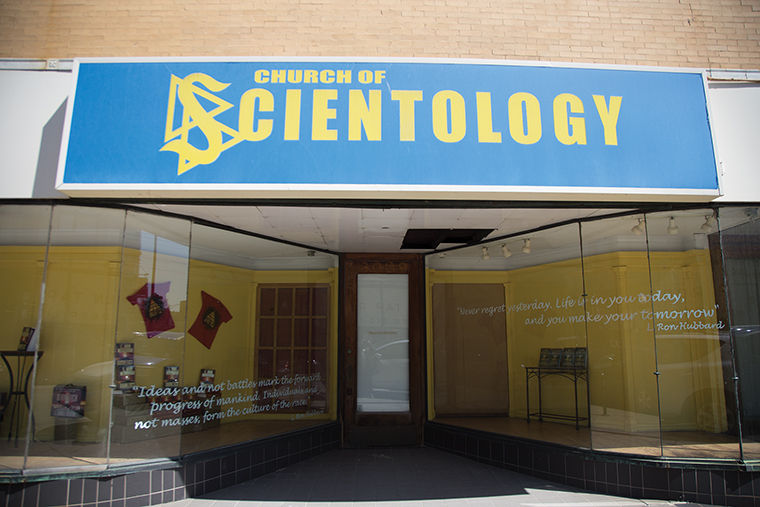Church of Scientology of Chicago relocating facility to Printer’s Row
The Church of Scientology’s sole Illinois facility, located at 3011 N. Lincoln Ave., is relocating to a 50,000-square-foot, six-story building at 650 S. Clark St. on Printer’s Row.
April 13, 2015
The Church of Scientology of Chicago, also known as the Hubbard Dianetics Foundation, located at 3011 N. Lincoln Ave. in Lakeview, is relocating to a 50,000-square-foot, six-story building on Printer’s Row at 650 S. Clark St.
The Church of Scientology of Chicago opened its original facility on Lincoln Avenue in 1974. The church will continue to operate out of its current location until renovations to the Clark Street location between Polk and Harrison streets are completed, said Rebecca Cusano, director of public relations for the Church of Scientology of Chicago in an emailed statement. Cusano has been a member of the church for 23 years.
Renovations to the new location are expected to be completed at the beginning of 2016, Cusano said. The church’s official grand opening date has not yet been decided, she said.
The Church of Scientology originally bought the building on Printer’s Row about 10 years ago, said the Rev. Ted Curtis of Grace Place Episcopal Church of Chicago in an emailed statement. Cusano said the Church of Scientology did not immediately relocate because her organization wanted to preserve the original architecture of the new location by working with city inspectors and the fire department to prevent potential damage to the structure, which has taken time to do. She said the church chose to relocate the building to Printer’s Row because of the historical draw of the architecture.
According to the Church of Scientology’s website, historical preservation of buildings is one the church’s global social betterment and humanitarian programs. Other programs include rehabilitation for drug abusers and convicts.
The Rev. Paul Huesing of Old St. Mary’s Catholic Church, 1500 S. Michigan. Ave., said he did not have any concerns about a Scientology church moving to Printer’s Row and being so near to his church, which was the first Catholic one built in Chicago in 1833.
“Scientology has a lot of controversy surrounding it,” Huesing said. “But you can’t forbid someone from opening a church or place of worship because we live in a country that has freedom of religion.”
L. Ron Hubbard, an American science fiction writer, founded Scientology in 1952. He based the religion on his self-help book titled, “Dianetics,” published in 1950.
According to the Church of Scientology’s website, “Scientology is a religion that offers a precise path leading to a complete and certain understanding of one’s true spiritual nature and one’s relationship to self, family, groups, mankind, all life forms, the material universe, the spiritual universe and the Supreme Being.”
Recently, HBO released “Going Clear,” a documentary directed by Academy Award-winning director Alex Gibney that profiles eight former Scientologists who scathingly criticized the religion.
The former Scientologists in the documentary criticized the church for being manipulative and abusive to its members and misleading in the representation of its views.
The Rev. Curtis said he has always warned his patrons to be careful when exploring any groups, especially those that are easy to join and hard to leave.
Scott Paeth, an associate professor of religious studies at DePaul University, said the criticism Scientology has received is not uncommon for religious groups.
“Religion gets a lot of criticism these days because we live in an increasingly secular, skeptical society,” Paeth said.
Paeth said many people criticize religion without knowing a lot about it because they believe all religion is nonsense. He said people criticize Scientologist and Catholic institutions for mistreating their members, and some people blame the doctrines of the religion. He said the individual perpetrators should be investigated when abuse does occur within a church community, but the religion as whole should not be written off because of it. He said religious doctrines are not to blame for peoples’ wrongdoings.
Paeth said he was surprised there was not a larger Scientology movement in Chicago seeing as it is a larger metropolitan area that is home to a wide variety of religious organizations and cultural groups. He said the creation of new religious movements and the exploration of different ideologies are both core parts of American society.
“Since the Mayflower, new religions have been forming over time in America, like Evangelists and Jehovah’s Witnesses,” Paeth said.
The Rev. Huesing added that the U.S. was built on religious freedom and freedom from prosecution for unpopular religious practices.
“I am a strong believer in freedom of religion,” he said. “People have the right to believe in whatever ideas they’d like to believe, and I think that’s the way it should be.”








